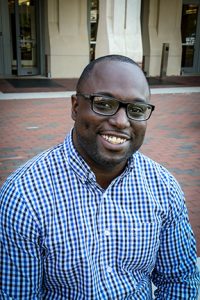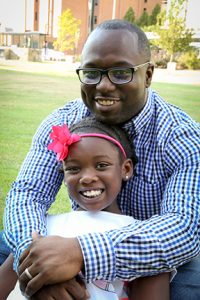Andrew Hinton was working in the shipyards around Norfolk, Virginia, when his young daughter was diagnosed with severe food allergies. That diagnosis, as stressful as it was, gave him the passion to change the course of his life, which led him to the UNC School of Medicine where he is enrolled in the Biomedical and Biological Sciences Program and beginning work towards earning his PhD.

Andrew Hinton was working in the shipyards around Norfolk, Virginia, when his young daughter was diagnosed with severe food allergies. That diagnosis, as stressful as it was, gave him the passion to change the course of his life, which led him to the UNC School of Medicine where he is enrolled in the Biomedical and Biological Sciences Program and beginning work towards earning his PhD.


By Jamie Williams, jamie.williams@unchealth.unc.edu
Like a lot of young men from Virginia’s Tidewater region, Andrew Hinton found himself working in the shipyards. And like a lot of those men, it was practicality not passion that led him there.
Hinton was looking for a way out of a bind. His grandmother, his anchor, his support, had recently passed away. All of a sudden, his college classes became a secondary concern. He needed to make some money. So he enrolled in an apprenticeship program typically offered to recent high school grads.
“They told me if I did the apprenticeship I could work and they would also pay for me to finish school,” Hinton said.
He worked hard. And people noticed. He rose through the ranks, eventually becoming modeling and simulation engineer, doing structural design for aircraft carriers.
Life was good.
“My wife and I purchased a home. We had a baby. Everything was going great,” Hinton said.
But in 2010, Hinton’s then two-year old daughter Madison was diagnosed with food allergies. It wasn’t a long diagnostic process. Her first reaction – to fish – was anaphylactic. The emergency room physicians told Hinton the hives and swelling on her lips signaled a multisystem involvement. Hinton said he had some minor allergies, but this was severe.
“Up until that point, I’d been doing what I thought I needed to do to be successful. After her diagnosis, though, I thought what if I could do something more?” Hinton said. “I just wanted to learn as much as I could. I didn’t want to just depend on the doctors to tell me what to do. I wanted to be more proactive.”
He wanted to figure out why some kids – why Madison – had developed this allergy. Armed with his engineering mindset, Hinton set out to build some sort of quantitative model. He remembers buying his first medical text book and reading it with the computer at his side so he could look up the meanings of nearly every medical term he came across. Read the book. Google a term. Read some more. Google a term. Tedious reading, but it was addictive. He couldn’t learn enough.
If they were going to dinner, Hinton would ask that his wife drive, so he could listen to medical lectures on his phone and take notes.
“I really feel like this gave my life meaning,” Hinton said. “Up until that point, I’d never really had a passion for anything.”
By this time, he’d finished his undergraduate studies in mathematics and enrolled in a modeling simulation graduate program at Old Dominion University. He was still working at the shipyard. At night, instead of resting, he’d read about allergies.
“I was so passionate, I could work all day and come home and just read. I was looking for any opportunity that I could find to learn more, I couldn’t get enough,” Hinton said.
Then, his life changed again.
“I went to a local conference and gave a brief presentation on some of the work I’d been doing in my spare time. I spoke afterwards with another parent. It was in that moment that I realized how much I had learned,” Hinton said. “That’s when I really began to ask ‘what if this is what I’m supposed to be doing?’”
He took his questions back to Old Dominion. There was one professor, Hinton remembers, who told him that he’d be better suited enrolling in a science PhD program where he could concentrate solely on his research.
“I told him I’d think about it, but then I just kept on doing what I was doing,” Hinton remembers.
Not long after, fate intervened again. Hinton was with his daughter at her allergist. Hinton brought up some recent research work he’d been doing. The allergist told Hinton that he really ought to contact her research mentor, Dr. Wesley Burks at UNC.
Hinton, not really expecting much, sent Burks an email. To his surprise, he got a response, and an invitation to come to Chapel Hill and spend some time in Burks’ lab at the UNC Food Allergy Institute.
He spent three days in the lab, meeting with Burks and other researchers. He got the chance to go to the clinic and meet parents whose children were also suffering with allergies. He got to talk science.
“It was incredible to just brainstorm with people who understood what I was talking about, but also knew so much more and could help me to see the next steps,” Hinton said. “Prior to that point, I was just having these conversations in my head.”
He remembers being asked to present some of the research he had done at a lab meeting. Hinton was nervous. He was totally self-taught, he’d never even taken a college-level biology course, and here he was presenting his work to some of the highest authorities in the world of food allergies. Like everything else he’d done, Hinton took it as a chance to learn.
“I just told myself to present the work confidently. These are brilliant people, so any questions or feedback they have are only going to help me grow,” Hinton said.
His work, he said, was well received. He left the lab and headed back home to Virginia with a new sense of validation and resolve.
“I’d been through the books, I’d read the papers, but being in this real live place and talking to people who had dedicated themselves to the same things I had, it motivated me to do whatever I needed to do to get here,” Hinton said.
It is, of course, not quite that easy. Hinton still had to go through the application and interview process. He had to figure out the steps necessary to move his family to Chapel Hill. He had to continue to convince himself he was making the right decision.
“At the shipyard I was a supervisor. I’d gone to school to become an engineer and I’d just been promoted to a project lead. Career wise, I’m sure some would say this is a step backward. And, sure, it’s a risk. Things will probably be pretty tight for a while financially, but you can’t just tie this decision to money. If one day down the line I’m involved with work that provides some relief to families dealing with allergies, every second will be worth it. How could I not do it?”
He arrived in August to begin working towards his PhD.
He credits his wife, who he says has been incredibly supportive. And he also hopes that Madison, now nine, will be inspired by his example.
“It is a cliché, but I want her to make a difference, I want her to change the world, and maybe, as she gets older, she’ll be able use this example and strive for something a little bit beyond her comfort zone,” Hinton said.
Though Hinton has a singular focus on studying food allergies, he’s excited by the opportunities to rotate through multiple different labs at UNC. He’s open to learning anything from everyone with something to teach him. More than anything, he’s ready to commit to science.
“I’ve never been in a situation where I could just focus on science,” he said. “I was always just fitting it in whenever I could find the time. I know how fortunate I am to have this opportunity and I’m going to make the most of it.”